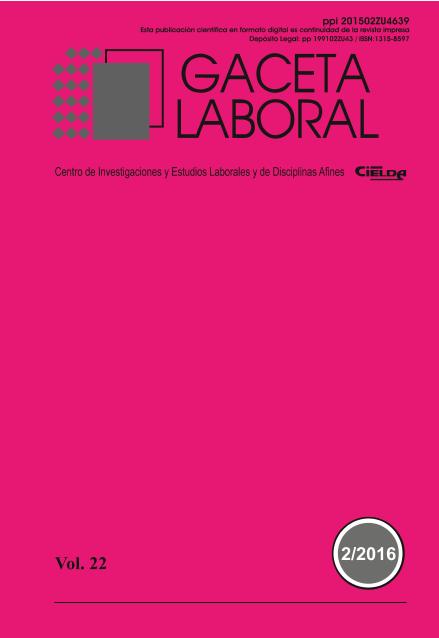Mostrar el registro sencillo del ítem
dc.contributor.author
Pla, Jésica Lorena

dc.date.available
2020-09-28T14:13:42Z
dc.date.issued
2016-08
dc.identifier.citation
Pla, Jésica Lorena; ¿Una nueva fragmentación social? Estado y Clases sociales objetivas y subjetivas en la Argentina de la década del 2000; Universidad del Zulia. Facultad de Ciencias Jurídicas y Políticas. Centro de Investigaciones y Estudios Laborales y de Disciplinas Afines; Gaceta Laboral; 22; 2; 8-2016; 72-101
dc.identifier.issn
1315-8597
dc.identifier.uri
http://hdl.handle.net/11336/114957
dc.description.abstract
El presente artículo expone los resultados de unainvestigación en la cual se abordan las percepciones de los sujetos sobre losprocesos de estratificación, el análisis de las clases sociales y la movilidadsocial en la Argentina contemporánea, caracterizada por un modelo deintervención estatal que se consolida en el año 2007, y que establece unvínculo entre la cuestión del trabajo y las políticas sociales, poniendo laidea de ?empleo? en el centro de las discusiones. Esta nueva relación entra entensión con la ideología neoliberal de individualización, propia de la décadaneoliberal de los años noventa. Para abordar el problema de investigación seponen en relación dos perspectivas teóricas, y una estrategia metodológicacualitativa (Echeverría Zabalza, 1999). Como técnica se utilizó el métodobiográfico. Las historias de vida se abordaron por medio de un análisistemático (y no la historia de vida como unidad en sí misma) desde unaperspectiva comparativa (Bertaux, 1994; 2005). Reconstruimos las percepcionesque los sujetos que atravesaron diferentes trayectorias de clase enuncian yconstruyen discursivamente, en lo que a mecanismos de intervención estatalrefieren, y particularmente el modo en que esas enunciaciones se relacionan conlas percepciones sobre el lugar que se ocupa en la estructura social ypotencialidades de ese espacio, diferencialmente con otros. Concluimos que elresquebrajamiento del consenso neoliberal en relación a las formas deintervención estatal no necesariamente fue acompañado por un resquebrajamientode los valores y principios en los cuales la sociedad organizó la vida común,conformó explicaciones y justificaciones sobre la desigualdad social.
dc.description.abstract
This paper presents the outputs of a research in which stratification, social classes and social mobility are approached from a perspective that incorporates the perceptions of the subjects regarding to the forms of construction of a symbolic normality about this issues during contemporary Argentina. In the last decade Argentina characterized itself by a model of state intervention that is consolidated in 2007, and establishes a new link between labor and social policies. This new relationship comes into tension with the neoliberal ideology of individualization, typical of the neoliberal decade, the nineties. To do so, it involves two theoretical perspectives, and a strategy that combines quantitative and qualitative techniques. The quantitative approach allowed us to describe trends that characterize social mobility and social stratification processes, which contextualize this article. The qualitative approach allowed us to analyze perceptions of one’s position in the social structure (Echeverria Zabalza, 1999). The biographical method was used. Life stories addressed through thematic analysis (and not the story of life as a unit in itself) from a comparative perspective (Bertaux, 1994; 2005). In this line, we reconstructed the perceptions that the subjects that make up different paths class enunciate and construct discursively, as far as mechanisms of state intervention concerned, and particularly the way in which these utterances are related to perceptions about one’s place in the social structure and the potential of that space, differentially with others. Our conclusions claim that the break of the neoliberal consensus regarding forms of state intervention was not necessarily hand to hand by a one of values and principles on which the society organized the common Life, and built explanations and justifications about social inequality.
dc.format
application/pdf
dc.language.iso
spa
dc.publisher
Universidad del Zulia. Facultad de Ciencias Jurídicas y Políticas. Centro de Investigaciones y Estudios Laborales y de Disciplinas Afines
dc.rights
info:eu-repo/semantics/openAccess
dc.rights.uri
https://creativecommons.org/licenses/by-nc-sa/2.5/ar/
dc.subject
CLASES SOCIALES
dc.subject
MOVILIDAD SOCIAL
dc.subject
CUESTION SOCIAL
dc.subject
ESTADO
dc.subject.classification
Otras Sociología

dc.subject.classification
Sociología

dc.subject.classification
CIENCIAS SOCIALES

dc.title
¿Una nueva fragmentación social? Estado y Clases sociales objetivas y subjetivas en la Argentina de la década del 2000
dc.title
Is it a new social fragmentation? State and social class, from an objective and a subjective point of view. Argentina in the first decade of 2000
dc.type
info:eu-repo/semantics/article
dc.type
info:ar-repo/semantics/artículo
dc.type
info:eu-repo/semantics/publishedVersion
dc.date.updated
2020-09-24T17:29:23Z
dc.journal.volume
22
dc.journal.number
2
dc.journal.pagination
72-101
dc.journal.pais
Venezuela

dc.journal.ciudad
Zulia
dc.description.fil
Fil: Pla, Jésica Lorena. Universidad de Buenos Aires. Facultad de Ciencias Sociales. Instituto de Investigaciones "Gino Germani"; Argentina. Consejo Nacional de Investigaciones Científicas y Técnicas; Argentina
dc.journal.title
Gaceta Laboral
dc.relation.alternativeid
info:eu-repo/semantics/altIdentifier/url/https://www.produccioncientificaluz.org/index.php/gaceta/article/view/22441
Archivos asociados
